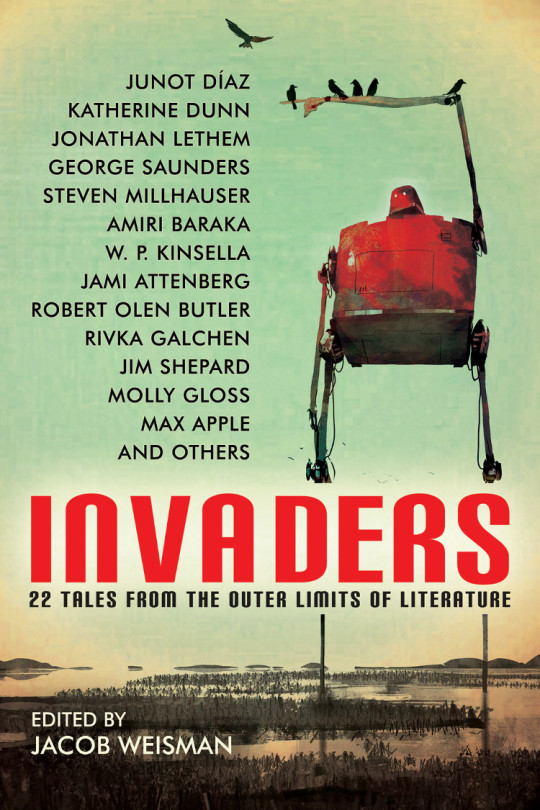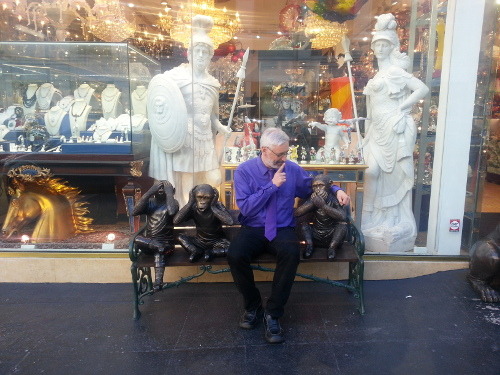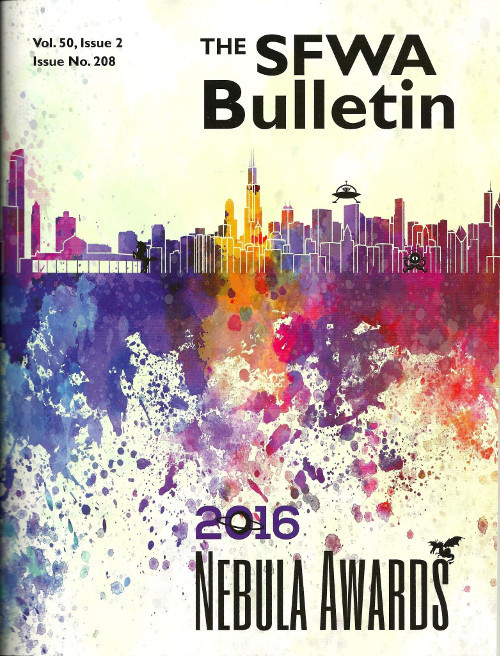INVADERS delivers the masters of their craft

Peter Dabbene of FOREWORD REVIEWS praises Jacob Weisman’s anthology INVADERS: 22 TALES FROM THE OUTER LIMITS OF LITERATURE.
Jacob Weisman settles—or perhaps provokes—the debate about what constitutes literature, and what represents “genre fiction”–science fiction, in this case–in the story collection INVADERS: 22 TALES FROM THE OUTER LIMITS OF LITERATURE.
<snip>
Smartly, Weisman addresses the elephant in the room immediately, with an insightful essay about the blurred lines separating those two sometimes arbitrary categories. Then, it’s time to jump into the stories themselves, which vary in content and style from the wordplay of Amiri Baraka (“See, you’re intelligent.[..] I’m outtelligent.”), to Millhauser’s trippy mock nonfiction, to Kinsella’s bizarre and humorous story of an alien who becomes the Seattle Mariners’ mascot. There are also affecting stories to be found, stories that probe the future of humanity with imagination and compassion, such as Julia Elliott’s “LIMBs” or Deji Bryce Olukotun’s standout “We are the Olfanauts”.
Because of the book’s variety, it demands a sense of open-mindedness toward what constitutes science fiction. But the writing itself is consistently excellent, and occasionally exquisite. There’s never a sense of these authors “slumming” in genre fiction simply because they can, or because they were solicited for an anthology contribution; the stories are what they need to be, and if that involves a doglike alien’s wordless meeting with a shepherd, so be it.
At its best, science fiction surpasses simple, conventional tales of “invaders from space.” With wry wit and sincere affection, this collection shows us that many times, the invaders not only have good intentions but also have much to share.

Jacob Weisman and friends (photo: Jill Roberts)
On his eponymous blog, Stephen R. Case reviews the anthology.
These stories are better than good. They’re sharp, subtle, and unfailingly well-crafted. Sure, some lack the excitement and straightforward pizzaz you might expect from magazines in which the editors are tasked primarily to entertain. Yet even these, such as J. Robert Lennon’s “Portal,” Max Apple’s “The Yogurt of Vasirin Kefirovsky,” and Kelly Luce’s “Amorometer” are still lovely and mysterious. There are think pieces in here as well, like Rivka Galchen’s “The Region of Unlikeness” or Steven Millhauser’s “A Precursor of the Cinema”. There are also two stories that take what may be the most tired science fiction trope of all, the alien encounter, and make it something new without actually doing anything different but by writing with a style that makes them positively luminous. I’m thinking, of course, of “Lambing Season” by Molly Gloss and “Help Me Find My Spaceman Lover” by Robert Olen Butler.
This stuff is science fiction as literature. These are stories written by artists who have abducted the genre for their own designs. They’re haunting, pristine, and sometimes devastating.
And then there are the pieces that are a whole lot better than good. Even if every other story in this collection had been a dud (and none of them are), four stories in here would still make Invaders completely worth the read. I’m thinking here specifically of Julia Elliott’s “LIMBs,” which tells a smart and heart-breaking story of geriatrics and technological advance, as well as love and aging; Deji Bryce Olukotun’s “We Are the Olfanauts,” a piece about personal sacrifice and the cost of success in a bizarre but strangely believable interpretation of the internet; and “Monstro” by Junot Diaz, which is somehow Akira meets Attack on Titan set in the Caribbean and told with a linguistic flare I could never hope to emulate or capture.
Finally, there is George Saunder’s “Escape from Spiderhead,” which wherever it was published (it was the New Yorker), genre or not, embodies what makes both great science fiction and great storytelling. It’s clean, simple, and as brutally efficient as a razor. I think, from now on, my writing prayer might simply be, “God, help me write a story as good as this one.” “Spiderhead” is the story of an idea just over tomorrow’s horizon taken to its unexpected and yet in retrospect unavoidable conclusion in language spare and merciless with characters simple and agonizingly real.
If you like science fiction that makes you think, and if you like stories told by writers who are masters of their craft, who use language as both a tool and a palette, this is the anthology you’ve been looking for.
If you’re already familiar with great science fiction authors who fit this description but are looking to expand your horizons further, you’re also looking for this book.
In his BLACK GATE report on the 2016 SFWA Nebula Conference in Chicago, John O’Neill includes his encounters with Jacob Weisman.
We returned to the hotel in time for the Welcome Reception at 8:00 pm. I spent most of the evening chatting with the delightful Tina Jens (another BG blogger — we were everywhere!) I met several of Tina’s students, an energetic bunch of talented young writers from her fantasy writing class at Columbia College, who were volunteering at the conference. We were eventually joined by Lynne M. Thomas, editor of the altogether excellent Uncanny magazine, Nebula nominee Charles Gannon, Sheila Williams, editor of Asimov’s SF, and Jacob Weisman, the brilliant publisher and editor at Tachyon Publications. When I ran into Rachel Swirsky we picked up our conversation from last year’s Nebulas, right at the point we were interrupted. Eventually, Tina, Jacob, Sheila and I found an empty table and chatted until the reception was long over.

Claire [Cooney] and Carlos [Hernandez], in fact, were the first couple of the weekend, the pair who best exemplified the spirit of the Nebulas: the sense of fun, inclusivity, and joyous spirit of community. My only regret is that I didn’t get to see Claire give her “Alternate World” acceptance speech. By then I was comfortably chatting with Jacob and Rina Weisman, Tina [Jens], Neil Clarke, Locus photographer Arly, and Tina’s students, in the halls of the hotel, where we remained until it was time for me to catch the last train.
For more info about INVADERS: 22 TALES FROM THE OUTER LIMITS OF LITERATURE, visit the Tachyon page.
Cover by Goro Fujita
Design by Elizabeth Story
